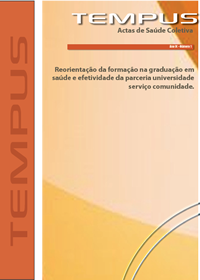Abstract
The University of Brasilia (UnB) and SES / DF participate in the Pró-Saúde Programme since 2007, which is an induction training of health workers program to offer a comprehensive approach to the health-disease with emphasis on primary care in order to promote changes in process of teaching and learning and, consequently, changes in the quality of services. The effects in changing the formation and incorporation of this vision need to be constantly evaluated. The objective of this study was to analyze the perception of scholarship students on the Pró-Saúde reaches on healthcare courses of Darcy Ribeiro Campus of UnB. The study was a quantitative, transversal and descriptive research. A tool for the analysis of the reorientation of training in healthcare courses was applied, divided into two sections: demographic data and perception of components of the Pró-Saúde (theoretical dimension, practical scenarios; reorientation training; pedagogical dimension). The 50 scholarship students (62.5% of the stock) showed the following results: age between 21 and 25 years (68%); female (72%); graduating in Nursing (32%), medicine (26%), Dentistry (12%) and others (30%); in the program for over 12 months (69.4%); monthly frequency of team meetings (44%); 90% said that few or no discipline nurture experience similar to Pró-Saúde; the theoretical dimension was observed values with small neutral trend (0.04); in practical scenario there was a positive trend (0.6); as well as the reorientation of training (0.82); the pedagogical dimension, neutral trend (0.19). The Pró-Saúde showed contributions to the most involved participants in the program.References
Ceccim RB. Inovação na preparação de profissionais de saúde e a novidade da graduação em saúde coletiva. Boletim da saúde. Porto Alegre. 2002;16(1):9-38.
Brasil. Ministério da Saúde, Brasil. Ministério da Educação. Portaria nº 2.101 denovembro de 2005. Institui o Pró-Saúde: Programa Nacional de Reorientação daFormação Profissional em Saúde. Brasília. Diário Oficial [da] República Federativado Brasil. 2005 nov. 16; Seção 3. p. 62.
Brasil. Ministério da Saúde. Portaria conjunta nº 10 de 14 de dezembro de 2010. Homologa o resultado do processo de seleção dos Projetos que se candidataram aoPrograma de Educação pelo Trabalho para a Saúde. Brasília. Diário Oficial [da]República Federativa do Brasil. 2011 dez. 1; Seção 1. p. 98.
Furlanetto DLC, Silva Junior JW, Bastos MM, Lima AA, Pinho DLM. Atitudes de Estudantes e Professores de Odontologia sobre a Reorientação na Formação Profissional. Arquivos de Ciências da Saúde (FAMERP).2014;21:68-77.
Ceccim RB, Bilibio LFS. In: Br MS. Observatório de recursos humanos em saúde noBrasil: estudos e análises. Observação da educação dos profissionais da saúde:evidências à articulação entre gestores, formadores e estudantes. 2002. p. 343-372.
Haddad AE, Morita MC, Pierantoni CR, Brenelli SL, Passarella T, Campos FE. Undergraduate programs for health professionals in Brazil. Revista de Saúde Pública.2010;44(3):383-393.
Brasil. Relatório de Gestão 2008-2010 da Universidade Aberta do Sistema Único de Saúde. Brasília, DF, Secretaria de Gestão do Trabalho e da Educação na Saúde, Ministério da Saúde. 2010.
Brasil. Ministério da Saúde. Portaria nº 1.507 de 22 de junho de 2007. Institui oPrograma de Educação pelo Trabalho para a Saúde. Brasília. Diário Oficial [da]República Federativa do Brasil. 2008 jan. 14; Seção 1. p. 37.
Arrais PSD, Aguiar ASW, Souza MAN, Machado MMT, Mota MV, Alves RS, Araújo MFM. Comprehensiveness: a pedagogical challenge for the Educational Program forHealth Work. Revista Brasileira de Educação Médica. 2012;36(1-2):56-61.
Leal JAL, Melo CMM, Veloso RBP, Juliano IA.Novos espaços de reorientação para formação em saúde: vivências de estudantes. Interface.2015;19(53):361-371.
A Tempus garante critérios rigorosos, por meio de avaliação sistemática. Os autores se responsabilizam pela veracidade e ineditismo do trabalho cabendo a eles a cessão de direitos de publicação à revista. A confiabilidade dos conteúdos e a marca própria de apresentação tem como objetivo uma comunicação personalizada, adaptada aos padrões da revista, na medida em que adota critérios de excelência exigidos por seus usuários e especialistas, considerando os rigores da comunicação científica. Os autores devem especificar sua contribuição individual na concepção, delineamento, execução do trabalho, análise ou interpretação dos dados, redação e aprovação final do manuscrito. Incluir Fontes de financiamento e de apoio logístico das pesquisas. Ao final da submissão do artigo, os autores devem enviar uma declaração de cessão de direitos de publicação à Revista TEMPUS , assinada e no formato PDF (Portable Document Format ): Modelo da declaração de cessão de direitos.
